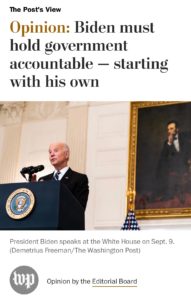The Accountability 2021 effort recognizes that the President has the power to create a government that is both responsive to and representative of the public—and demands that whoever sits in the Oval Office take steps to do so.
In January of 2020, nearly two dozen organizations came together to begin work on setting an agenda for a more accountable government. What united them was not a partisan political agenda but the belief that (1) our democratic institutions must be more accountable to the public they serve; (2) and the time is ripe, no matter who holds the office of the presidency in 2021, to set in motion an agenda that advances accountability. Over the months that followed, dozens more organizations joined the effort. The fruits of their efforts are concrete proposals that the President can begin to put in place to advance accountability on January 20, 2021.
But what is an accountable government? For those who contributed to the Accountability 2021 effort, it is a government that is both responsive to and representative of the public. It means the people have access to all government information necessary to hold the government accountable—not just the information those in power wish to disclose for political purposes. It means that the rule of law applies to public servants and that there will be consequences for those who violate the rules. It means that decision-making will consider all perspectives, not just those of the powerful or well-connected, and that the public has a voice in the process. And it means that when the government acts, outcomes are not dictated by whether one lives in a red state or a blue state, or one’s economic status, race, ethnicity, religion or gender; rather it is acting in the best interest of the country and its people.
The Accountability 2021 effort recognizes that the president has the power to create a more accountable government and demands that whoever sits in the Oval Office take steps to do so. By encouraging agencies to use compliance mechanisms, hiring qualified personnel and requesting budgets sufficient to ensure agencies can fulfill their mandates, the president can rebuild an ecosystem where regulations actually have the ability to protect the public interest. No single effort can remedy all of the ways our democratic institutions fail the people they are supposed to serve. However, if the president takes steps outlined here (and urges Congress to codify many of these recommendations), he can progress towards creating a government of, by, and for the people.
The Accountability 2021 recommendations are guided by eighteen core principles that fall into broad categories that reflect much of what is necessary to create a responsive government: Open Government, Ethics, Balance of Power, Whistleblowers, Responsive Government, and Pandemic Preparedness and Response. Recognizing that the president will face the continuing fallout of the COVID-19 outbreak, the Accountability 2021 contributors added Pandemic Preparedness and Response as a sixth category in need of accountability reform.

